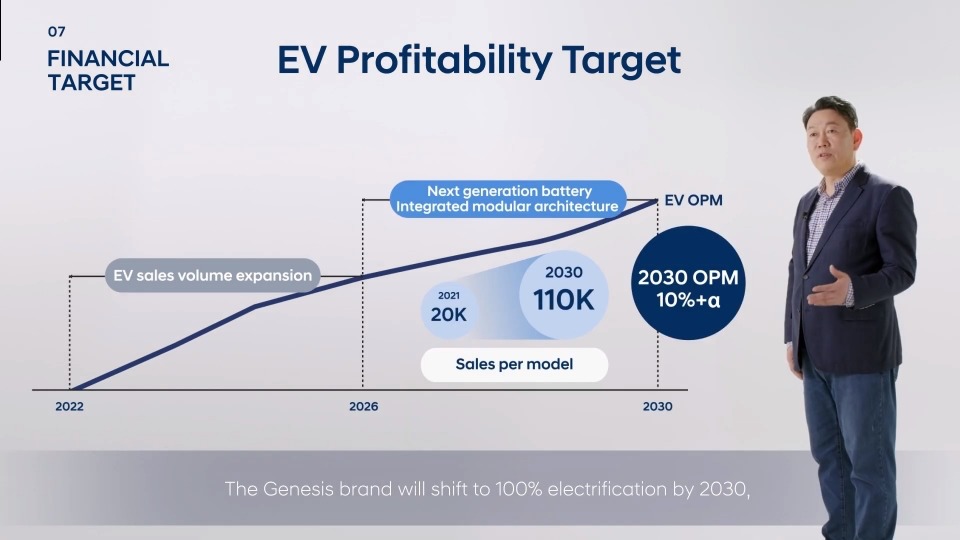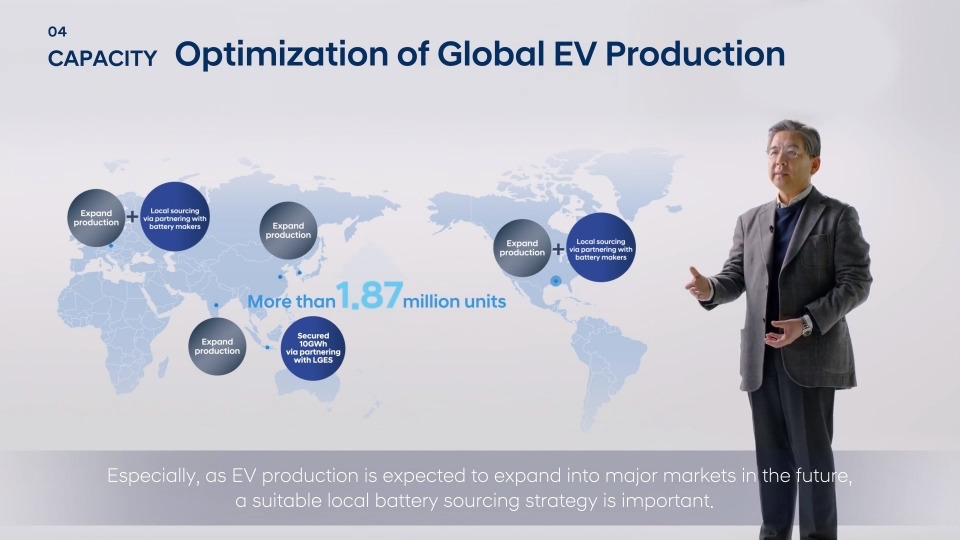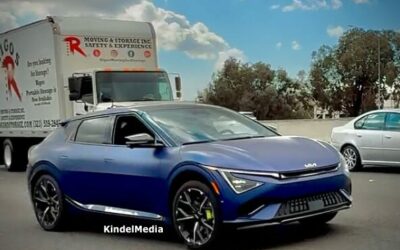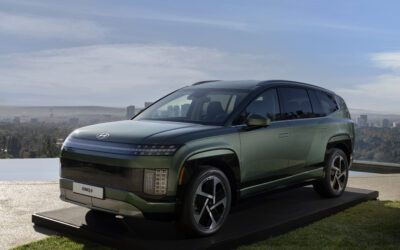Hyundai Motor plans to build a lineup of more than 17 electric vehicles by 2030 and achieve global electric vehicle sales of 1.87 million units and a market share of 7%. Based on this, Hyundai Motor plans to achieve a profitability of over 10% in the electric vehicle sector by 2030.
Yesterday, Hyundai Motor held ‘2022 CEO Investor Day’ through an online conference and announced its mid and long-term electrification acceleration strategy and financial goals to shareholders, analysts, and credit rating agencies. At the event, Hyundai Motor Company announced that it would promote mid-to-long-term electrification strategies such as expanding production in areas where demand for electric vehicles is concentrated, developing next-generation battery technology and promoting battery modules, and strengthening EV marketability that encompasses hardware and software.
In particular, in 2025, we will introduce two new dedicated electric vehicle platforms, such as ‘eM’, a platform dedicated to passenger electric vehicles and ‘eS’, an exclusive platform for PBV (purpose-based mobility) electric vehicles. We decided to strengthen our capabilities. Based on this, Hyundai Motor plans to expand the operating profit ratio of the consolidated business to 10% by 2030, and invest 95.5 trillion won in future businesses for this purpose.
President Jang Jae-hoon said, “As a ‘mobility solution provider’, Hyundai Motor Company will promote the sustainable development of the company by continuously providing optimized services and generating profits by not only improving the hardware performance of mobility devices but also reinforcing software capabilities.”

More specifically, Hyundai Motor has set its mid- to long-term EV sales targets, including Genesis, to 840,000 units in 2026 and 1.87 million units in 2030. It plans to expand the sales volume of electric vehicles, which recorded 140,000 units per year in 2021, 6 times within 5 years and more than 13 times within 10 years. When this goal is achieved, Hyundai Motor’s global EV market share will jump from 3% in 2021 to 7% in 2030, and it is expected that the market share will rise from 6% in 2021 to about 12% in 2030 on a Hyundai Motor Group basis.
As a result, the proportion of Hyundai Motor and Genesis’ electric vehicle sales, which stood at 4% in 2021, is expected to rise to 17% in 2026 and 36% in 2030. Previously, Hyundai Motor announced that it will accelerate the transition to electrification by declaring ‘carbon neutrality by 2045’ last year, including 100% electrification of Genesis in 2030, 100% electrification of sales in Europe in 2035, and 100% electrification in major markets by 2040.
Hyundai Motor predicted that the global electric vehicle market will continue to expand based on each country’s policies to strengthen support for electric vehicle markets. Hyundai Motor plans to focus on major electric vehicle markets, including the United States and Europe, which are emerging as the largest electric vehicle markets.
By region, Hyundai Motor plans to sell 530,000 electric vehicles, or 58% of the total car sales, in the U.S. market by 2030 to achieve an 11% share of electric vehicles in the U.S. In Europe, it sold 480,000 electric vehicles, accounting for 69% of sales, to secure a local electric vehicle market share of 6%, and sold 290,000 units in the Korean market to account for 58% of electric vehicle market share.
Hyundai and Genesis have agreed to build a total of 17 or more electric vehicle models by 2030. By brand, Hyundai sells 11 electric vehicles and Genesis sells six or more electric vehicles. By releasing the Ioniq 6 this year and the Ioniq 7 in 2024, they plan to build an electric vehicle lineup of 6 SUVs, 3 passenger vehicles, 1 small commercial vehicle, and 1 other new vehicle type by 2030. The company plans to expand its lineup centering on high-margin SUVs while launching regional-specific strategic models to sell 1.52 million electric vehicles annually by 2030.
Following the launch of all new cars as electrified vehicles from 2025, Genesis plans to build an electric vehicle lineup of more than six models, including four SUVs and two passenger vehicles, by 2030. Genesis previously introduced the G80 electrified model and the dedicated electric vehicle GV60 last year, and this year, the GV70 electrified model is about to be released. Genesis plans to differentiate itself as a luxury electric vehicle brand and achieve a 12% share in the global luxury electric vehicle market by selling 350,000 electric vehicles by 2030.
Hyundai Motor is promoting production efficiency and optimization as a way to expand electric vehicle sales, while devising a ‘comprehensive battery strategy’ to secure stable battery volume and develop next-generation battery technology. First, in order to effectively respond to the increasing demand for electric vehicles and reduce manufacturing costs, the existing internal combustion engine-centered production facilities will be quickly converted to a production system optimized for electrification.
The ‘Hyundai Motor Group Singapore Global Innovation Center’, to be completed in Singapore in the second half of this year, is a manufacturing innovation platform that will support the efficiency of the overall vehicle production system, including electric vehicles. The advanced logistics system and flexible production structure introduced here will be applied to all Hyundai Motor’s global factories in the future.
Furthermore, Hyundai Motor Company has decided to optimize global electric vehicle production by actively expanding production centering on regions where electric vehicle demand is concentrated in the future. Among the current 9 global production bases, we plan to further expand our electric vehicle production bases in Korea and the Czech Republic. In addition, Hyundai is reviewing the establishment of an electric vehicle-only plant in addition to the existing production plant.
Hyundai Motor Company established a ‘Battery Comprehensive Strategy’ that combines three strategies: procurement, development, and modularization to promote stable battery procurement and battery performance advancement, which are essential for smooth expansion of electric vehicle production. First, it plans to further solidify its friendly relationship with global top-tier battery companies in order to secure 170GWh batteries required to sell 1.87 million electric vehicles in 2030. Based on this close cooperation, we have secured batteries that can meet the target number of electric vehicles sold by 2023 at an early stage.
In particular, in order to respond to the growing demand for electric vehicles and secure price competitiveness, Hyundai Motor decided to actively promote local battery procurement in key regions by forming an alliance with battery companies. Hyundai Motor Group will establish a battery cell joint plant in Indonesia with LG Energy Solutions to produce 10GWh lithium-ion batteries that can be applied to 150,000 electric vehicles annually from 2024. cooperation is being promoted. Through this strategic alliance, Hyundai Motor plans to procure 50% of the next-generation lithium-ion batteries to be applied after 2025.
In addition, Hyundai Motor is diversifying battery types from NCM (nickel, cobalt, manganese) batteries to LFP (lithium iron phosphate) batteries to respond to the demands of various markets, including advanced and emerging markets, and expand EV sales. It plans to improve price competitiveness by diversifying battery suppliers. In addition, to achieve performance improvement and cost reduction, which are essential for future electric vehicle competitiveness, Hyundai Motor is promoting maximizing the performance improvement of existing lithium-ion batteries, while also focusing on the development of next-generation battery technologies such as all-solid-state batteries.






